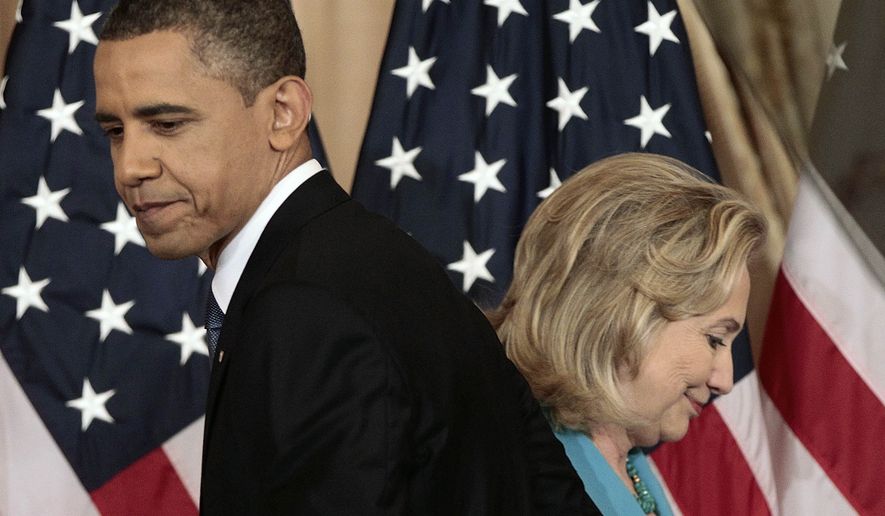A think tank with ties to Democratic presidential candidate Hillary Rodham Clinton issued strong criticisms Thursday of the Obama administration’s strategy to combat the Islamic State, with analysts writing that the U.S. is “failing” and needs to change course.
Two former Obama national security aides broke with the president by urging the deployment of American ground troops to directly help the disheveled Iraqi army. One used the word “failing” to describe how the administration is arming the Baghdad military.
Mrs. Clinton helped launched the Center for a New American Security (CNAS) with a keynote speech in 2007. The center is directed by Michele Flournoy, the former undersecretary of defense for policy for President Obama, and who is viewed as a candidate for defense secretary in a Clinton administration.
CNAS issued seven papers Thursday on defeating the Islamic State, also known as ISIS and ISIL, with proposals far different from the current Obama strategy of relying on limited airstrikes and training Iraq’s unproven army to do the ground combat against a growing and vicious terrorist force.
The analyses could be viewed as a preview of how a potential President Clinton would change course in confronting the Islamic State in Iraq, Syria and globally.
CNAS analyst Philip Carter, who deployed to Iraq as an Army officer advising the police, and who later became Mr. Obama’s chief of detainee policy, calls for a significant deployment of American ground forces, an option Mr. Obama has avoided.
PHOTOS: Top 10 U.S. fighter jets
“To defeat ISIS in Iraq, the United States must deploy special operations forces (SOF) to directly advise and assist Iraqi forces in combat and embed those SOF advisors at the tactical echelons where they can make a difference,” Mr. Carter writes.
Noting the May 18 rout of Ramadi and Defense Secretary Ashton Carter’s lament that Iraq’s army lacks the “will to fight,” Philip Carter says: “Unfortunately, the current U.S. effort in Iraq provides them neither the right materiel nor the will to fight. The United States has committed just enough to Iraq to signal our support for the Iraqi government but not enough to achieve our objective: the defeat of ISIS. Without a more robust deployment, and a decision to commit embedded combat advisors to bolster Iraqi forces, we will not succeed in Iraq.”
Shawn Brimley, who was on the White House national security staff until 2012, and before that was an adviser to Ms. Flournoy, used the word “failing” to describe how the administration currently is arming Baghdad. Iraq’s leadership seems incapable of distributing resources to Iraqis willing to fight.
“If this is true, then reinforcing a failing strategy that depends on Baghdad doing the right thing might not only be misguided but counterproductive,” he writes. “A better approach might be to surge resources to those actors in Iraq who we judge would actually take on ISIS on the battlefield.”
“There are actors — the Kurdish peshmerga and several Sunni tribes — that would benefit from more direct support from the United States and its allies. It may be possible to deploy special operations forces and other capabilities more directly proximate and responsive to these actors.”
Ilan Goldenberg is a former adviser to then-Sen. John F. Kerry when he was chairman of the Senate Committee on Foreign Relations. Now secretary of state, Mr. Kerry is trying to nail down a nuclear agreement with Iran as it expands its Shiite forces in the Middle East.
SEE ALSO: Obama’s Islamic State strategy sparks doubt, resentment among Pentagon officials
In an apparent break with current Syria and Iran policy, Mr. Goldenberg said the administration needs to arm a “nonextremist” Syrian Sunni force and possibly “direct limited American military intervention to support this force.”
He said the administration also needs to “push back more directly” on Iran’s support for various groups that are seen as destabilizing.
“This would signal to Tehran that it risks a direct confrontation with the United States unless it shifts course in Syria and Iraq but also that if it does change its strategy, an opportunity for a negotiated solution exists,” Mr. Goldenberg writes.
The center has a bipartisan wing. Its president is Richard Fontaine, who for years was foreign policy adviser for Sen. John McCain, Arizona Republican.
Mr. Fontaine writes that the Islamic State continues to expand in the face of nearly a year of U.S.-led airstrikes in Iraq and Syria, where the terrorist army controls much territory.
“U.S. power should focus on containing ISIS’ continued expansion and then rolling back its gains,” he said. “Failing to step up American efforts now will leave ISIS more entrenched in more places, with momentum on its side, which requires even more American power to stop it. The moment to expand U.S. efforts, still within limits, has arrived.
“By some measures — the ability to sell oil, for instance, or engage in command and control — ISIS has no doubt been diminished by the U.S.-led air campaign,” he added. “But the overall sense left among regional observers is that the current strategy is failing.”
Several former senior military officers have come forward in recent months to call for a change in the Obama administration’s Iraq strategy. The CNAS analyses represent stiff criticism from some of Mr. Obama’s former political appointees.
• Rowan Scarborough can be reached at rscarborough@washingtontimes.com.




Please read our comment policy before commenting.